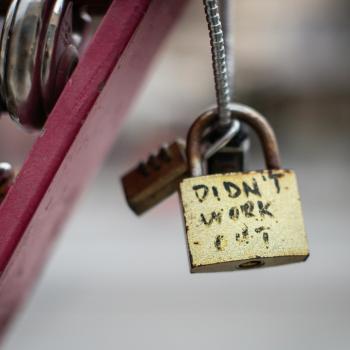
Image by Jacques GAIMARD from Pixabay
There is no easy or gentle way to say it: I set my house on fire. Not literally, but figuratively, I burned most everything in my world to the ground. If trust were a vase, I didn’t just knock it over; I bulldozed it with the emotional equivalent of a Mack truck, backed over it a few more times to ensure it was thoroughly pulverized, and then attempted to piece it back together with excuses and duct tape. So, this article isn’t based on theory for me; it’s lived experience. I know what it’s like to destroy something sacred and to live with the ache of regret. I understand how it feels to stand in the rubble, wondering if anything good can emerge from your mess.
The short answer? Yes, healing is possible.
But not without cost. Not without humility. And not without Jesus. Rebuilding your life after betrayal, infidelity, or failure is a painful and challenging process. The path forward begins with humility, brutal honesty, and the kind of grace that doesn’t erase consequences but offers a new beginning if you dare to walk through the fire toward redemption.
Here’s what I’ve learned about rebuilding trust from the ground up:
-
Own It. Fully. Without Conditions or Deflection.
You cannot rebuild what you won’t take full responsibility for. Don’t say, “I’m sorry you felt hurt.” That’s not an apology; that’s a dodge. That’s like accidentally setting your neighbor’s house on fire and saying, “Sorry your curtains were flammable.”
Scripture says it clearly: “Whoever conceals their sins does not prosper, but the one who confesses and renounces them finds mercy” (Proverbs 28:13).
If you cheated, lied, or emotionally abandoned someone, say so. Out loud. Name it. Own it. No gaslighting. No blame-shifting. No “but you did too!” nonsense. If you’ve made a mistake, whether it was through betrayal, neglect, lies, or a gradual shift into selfishness, own up to it. Confession isn’t just good for the soul; it’s essential for healing someone else’s heart. Shine the light of confession on the darkest corners of your failure.
In my first book, Epic Grace, I wrote, “God doesn’t blush at our sin, but He won’t fix what we refuse to reveal.” You can’t heal what you hide. Bring it all to the table, even the gross, embarrassing stuff.
-
Apologize Like Someone Who’s Been Wrecked by What They’ve Done
A genuine apology has weight. It costs something. It’s not polished. It’s not performance. It’s a confession that leaks out through trembling lips and wet eyes.
It sounds like this: “I betrayed your trust. I was selfish. I broke something sacred between us. You didn’t deserve that pain. I am deeply, gut-wrenchingly sorry.” That kind of apology stings, but that sting is the beginning of the healing process.
If it doesn’t ache to say, it probably won’t help them heal.
“The sacrifices of God are a broken spirit; a broken and contrite heart, O God, you will not despise” (Psalm 51:17).
-
Kill the Behavior That Caused the Damage
Stop the bleeding. Right now. Not later. Not after your next “one last time.” Whether it’s a lie, an addiction, or a passive neglect of your partner’s heart, end it, bury it, and build new habits. Don’t apologize with one hand while still scrolling through secret messages with the other. Don’t cry and repent while keeping your addiction on life support. Repentance means change.
Jesus didn’t say, “Feel bad about it.” He said, “Go and sin no more” (John 8:11). If the thing that shattered trust is still part of your life, you’re not rebuilding; you’re re-wounding. My therapist once told me, “You can’t heal in the same environment that made you sick.”
Change the environment. Get accountability. Get therapy. Build new rhythms and routines.
Repentance isn’t something you do on a Sunday; it’s something you live on Monday, Tuesday, and every day after.
-
Stop Rushing Their Healing
Oh man, this one hurt me to learn. I wanted forgiveness to be a vending machine: insert apology, receive restored intimacy. But it doesn’t work that way. Trust heals slowly. It’s not microwaved; it’s marinated. Your urgency to move on usually reflects your discomfort more than their healing.
Your timeline doesn’t matter. Theirs does.
I love this quote by Kermit Zarley, “For a show of remorse to be truly effective, it should be focused on the other person’s feelings and needs, not your own.”
Instead of asking, “Are we good yet?” say, “I’m here. I’m committed to restoring this, even if it takes years. Even if you never fully trust me again.” That’s not weakness; that’s strength.
“Love is patient…” (1 Corinthians 13:4).
-
Live in the Light
Do you want to rebuild trust? Start by eliminating secrets. Secrets are fertilizer for distrust. You can’t rebuild with half-truths and hidden passwords. My wife, Katherine, has full access to my digital life. Not because she’s suspicious, but because I don’t want to live in the shadows ever again.
If you truly desire to rebuild trust, turn on all the lights. Let them see everything, not as a means of control, but as a gift.
“God is light; in Him there is no darkness at all” (1 John 1:5).
-
Let Grace Do What Only Grace Can
There will come a moment when you realize that even your best efforts may not be enough to fix it. You’ll realize that no matter how many good days stack up, you can’t undo the worst one. That’s where grace shows up.
- The grace that whispers, “You are not your worst decision.”
- The grace that says, “You’ve got a limp now, but you can still walk forward.”
- The grace that reminds you that even if they can’t forgive you yet, God already has.
You don’t deserve grace. Neither do I. But God gives it anyway.
“But where sin increased, grace increased all the more” (Romans 5:20).
-
Even If the Relationship Doesn’t Survive… You Still Can
This part stings the most. Because sometimes the damage is too deep. Sometimes, the person you hurt won’t come back. They might leave. And it will feel like your insides are being ripped out. But hear me: This doesn’t have to be the end of you.
You can still become a person of integrity. You can still become the kind of person who’s safe, consistent, and trustworthy, not to prove a point, but because it’s who God is making you into. Even if they never see your healing, your Redeemer does.
Final Word from a Recovering Idiot
I’ve messed up. I’ve sinned. Publicly. Painfully. Repeatedly.
And I’ve walked that long, slow road of rebuilding. It’s exhausting. It’s humbling. It’s brutal at times. But it’s also holy.
Because when love survives a failure, when grace keeps showing up, when trust is born again after death… That’s sacred ground. That’s Jesus at work. And that’s hope for every screw-up like me and maybe like you.
As I wrote in another article, remember this: God doesn’t wait until the dust settles to show up. He kneels with you in the middle of it. He’s not asking you to clean it all up—He’s asking you to let Him all the way in.
So, if you’re staring at a relationship that looks like a pile of broken glass, don’t quit.
Ask Jesus to pick up one piece. Then another. Don’t give up. God’s not done with your story yet. His specialty is turning messes into miracles.
“He heals the brokenhearted and binds up their wounds” (Psalm 147:3).

Image by Pexels from Pixabay












